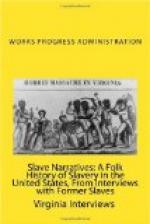“By the way you knows Squire Gellison wuz sum fishahman an’ shure to goodness ketched lots ob fish. Why he’d ketch so many, he’d clean ’em, cut ’em up, put ’em in half barrels an’ pass ’em ’round to de people on de farms.”
“Most de slaves on Marse Hunt’s place had dir own garden patches. Sumtimes dey’d have to hoe the gardens by moonlight. Dey sell deir vegetables to Marse Hunt.”
“In de summah de women weah dresses and apruns made ob linen an’ men weah pants and shurts ob linen. Linsey-woolsey and jean wuz woven on de place fo’ wintah clothes. We had better clothes to weah on Sunday and we weahed shoes on Sunday. The’ shoes and hoots wuz made on de plantashun.”
“My mastah wuz Marse Harley Hunt an’ his wife wuz Miss Maria Sanders Hunt. Marse and Miss Hunt didn’t hab no chilluns of der own but a nephew Marse Oscar Martin and niece Miss Mary Hunt frum Missouri lived with ‘em. Dey’s all kind to us slaves. De Hous’ wuz great big white frame with picket fence all ’round de lot. When we lived Charl’stun Marse Hunt wuz a magistrate. Miss Hunt’s muthah and two aunts lived with ’em.”
“No mam, we didn’t hab no ovahseeah. Marse Hunt had no use fo’ ovahseeahs, fact is he ’spise ’em. De oldah men guided de young ones in deir labors. The poor white neighbahs wurn’t ’lowed to live very close to de plantashun as Marse Hunt wanted de culured slave chilluns to be raised in propah mannah.”
“I duzn’t know how many acres in de plantashun. Deir wuz only ’bout three or fo’ cabins on de place. Wurk started ’bout seben clock ’cept harvest time when ebrybudy wuz up early. De slaves didn’t wurk so hard nor bery late at night. Slaves wuz punished by sendin’ ’em off to bed early.
“When I’se livin’ at Red House I seed slaves auctioned off. Ol’ Marse Veneable sold ten or lebin slaves, women and chilluns, to niggah tradahs way down farthah south. I well ‘members day Aunt Millie an’ Uncl’ Edmund wuz sold—dir son Harrison wuz bought by Marse Hunt. ‘Twuz shure sad an’ folks cried when Aunt Millie and Uncl’ Edmund wuz tuk away. Harrison neber see his mammy an’ pappy agin. Slaves wuz hired out by de yeah fo’ nine hundred dollahs.”
“Marse Hunt had schools fo’ de slaves chilluns. I went to school on Lincoln Hill, too.”
“Culured preachahs use to cum to plantashun an’ dey would read de Bible to us. I ‘member one special passage preachahs read an’ I neber understood it ’til I cross de riber at Buffinton Island. It wuz, ’But they shall sit every man under his own vine and under his fig tree; and none shall make them afraid; for the mouth of the Lord of Hosts hath spoken it.” Micah 4:4. Den I knows it is de fulfillment ob dat promis; ‘I would soon be undah my own vine an’ fig tree’ and hab no feah of bein’ sold down de riber to a mean Marse. I recalls der wuz Thorton Powell, Ben Sales and Charley Releford among de preachahs. De church wuz quite aways frum de hous’. When der’d be baptizins de sistahs and brethruns would sing ’Freely, freely will you go with me, down to the riber’. ’Freely, freely quench your thirst Zion’s sons and daughtahs’.”




